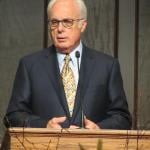Philip Jenkins has an excellent brief introduction to the thought of the Indian Muslim thinker, Syed Abul Ala Mawdudi, in the December 24 issue of TNR . He writes: “His guiding assumption was a totalistic view of Islam: Everything in the universe was God’s creation, so Muslims could freely use modern technology and organization—but only to build a visionary new Islamic order. Where Mawdudi broke from his contemporaries was in his utter rejection of all historic Islamic models as unworthy... Read more















